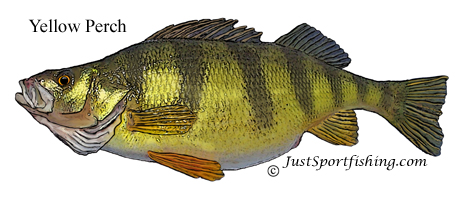|
Home Game Fish Fishing Knots Tackle Tips Videos Pictures Tips Rods & Reels Boats Cook your Catch Articles About Contact |
|
Donate to JustSportfishing.com and help to build the largest fishing information site on the web. Even a dollar or two will keep us building this free site.
|
Yellow
Perch World
Record
~ 4 Lbs 3 oz. Caught at Bordentown, NJ on May, 1865 by angler Dr. C.C.
Abbot Scientific
name
~ Perca Flavescens Other
names
~ Ringed Perch, Striped Perch, Coon Perch, Jack Perch, Lake Perch,
American Perch Identification ~ Yellow perch have a long-looking body, but they are not as slim in appearance as other perch family species. The upper part of the head, back and sides is olive-green to golden-brown, shading to lighter yellow-green or yellow on the sides. The underside is white or grayish. Some back and side scales are dark and form a pattern of six to nine vertical stripes that narrow as they approach the belly. These stripes are a perch's most distinctive feature. The pectoral, pelvic and anal fins are pale-yellow, becoming bright-orange on breeding-season males. The tail is slightly forked. The two dorsal fins are separated. The front dorsal fin has 13 to 15 sharp spines, and one or two spines can be found on the leading edge of the rear dorsal fin. The rest of the rear dorsal fin has soft rays. The anal fin has two spines, and there is a spine on the trailing edge of the gill cover.
Size
~ Most angler caught Yellow Perch are 6 to 10 inches and less than 3/4
of a pound. Habitat
~ Yellow perch live in a variety of aquatic habitats, including warm or
cool lakes, ponds and sluggish streams. A prime yellow perch lake is
cool and clear, with a sandy or gravelly bottom and rooted underwater
vegetation. They also inhabit lakes with soft bottoms. Yellow perch are
considered shallow-water dwellers and are not usually caught more than
30 feet deep. Yellow Perch prefer water temperatures between 65 F and 73
F. Feeding
Habits
~ The diet of the Yellow Perch is made up of zooplankton, insects, small
crayfish, fish eggs, aquatic insects, snails, and young perch.
|


